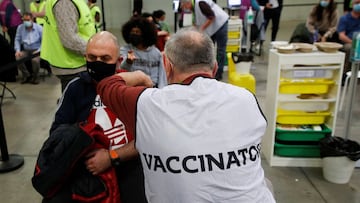What are the side effects of the third dose of Moderna and Pfizer vaccines?
Some recipients experienced adverse reactions after receiving the covid-19 booster shot but a new study suggests that the reports have been greatly exaggerated.


A study published by the Centers for Disease Control and Prevention has reiterated the importance of getting a booster shot after the first two doses of the Moderna, Pfizer and Johnson & Johnson vaccines.
On Tuesday the CDC released the data, which showed that those who had received their booster dose had greater protection against both infection and against severe illness and hospitalisation.
As was the case with previous rounds of vaccinations some recipients report experiencing mild side effects in the hours after receiving the booster dose. However studies have suggested that some of the most common complaints could actually be a result of a negative version of the placebo effect.
Updated data: The COVID death rate among unvaccinated people is 48-times higher than among vaccinated people who received a booster.
— Max Roser (is hiring an Executive Assistant) (@MaxCRoser) February 4, 2022
This is the latest age-standardized data from Switzerland.
[From this post with @redouad: https://t.co/nNmfYAk0m1] pic.twitter.com/CoYDnp8D4I
Booster vaccine side effects
By far the most widely-used coronavirus vaccines on offer are the Pfizer and Moderna shots, while the single-dose Johnson & Johnson version is often used to reach recipients in remote areas.
Clinical trial data from the three manufactures found that the most common complaints after receiving a booster shot were injection site pain, fatigue, headaches and muscle pain. All of these are typically fairly mild and are broadly the same as with the initial vaccine course.
Beyond those common side effects, there are some differences between the different manufacturers’ booster shots. Recipients of the Pfizer booster reported chills; some who got the Moderna shot experienced mild joint pain; and some got nausea after receiving their second dose of the Johnson & Johnson vaccine.
Evidence from Israel’s booster roll-out, one of the first countries to offer an additional dose, suggests that there have been “substantially lower” reports of side effects from the additional shots. This is corroborated by data from the Johnson & Johnson booster trial which found that side effects were reported less frequently after the second shot, the booster, when compared to the first.
Covid-19 vaccine side effects may be over reported
New research published last month has suggested that up to two-thirds of the common side effects reported after a covid-19 shot may not be a consequence of the vaccine. Scientists have brought together data from 12 clinical trials of the most common coronavirus vaccines and found that a concept known as the ‘nocebo effect’ could be responsible for more than half of the complaints.
What is a Nocebo effect? And is it the reason you didn't feel good after getting your COVID vaccine? https://t.co/1pNgi4jebQ pic.twitter.com/66jvgigANt
— Vincent Iannelli, MD (@AboutPediatrics) February 2, 2022
The nocebo effect is the negative version of the placebo effect and scientists have suggested that many of the more mild side effects may simply be brought about by the expectation of experiencing some discomfort.
Related stories
The combined study found that the nocebo effect could account for around 76% of negative reactions to the first dose, and 52% of those reported after the second dose.
Ted Kaptchuck, a senior author on the study and professor of global health and social medicine at Harvard, said of the findings: “Telling patients that the intervention they are taking has side-effects that are similar to placebo treatments for the condition in randomised controlled trials actually reduces anxiety and makes patients take a moment to consider the side-effect.”

